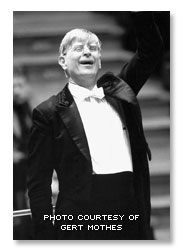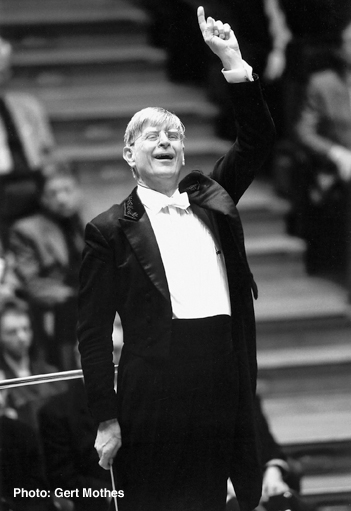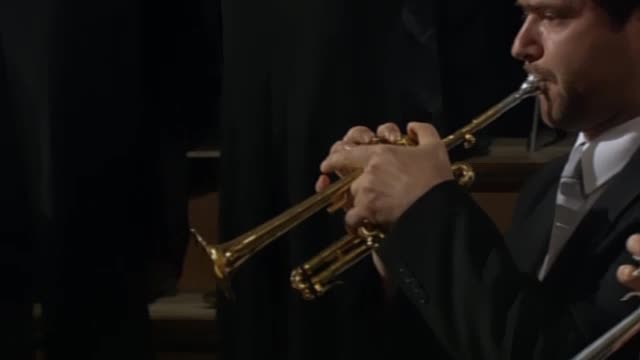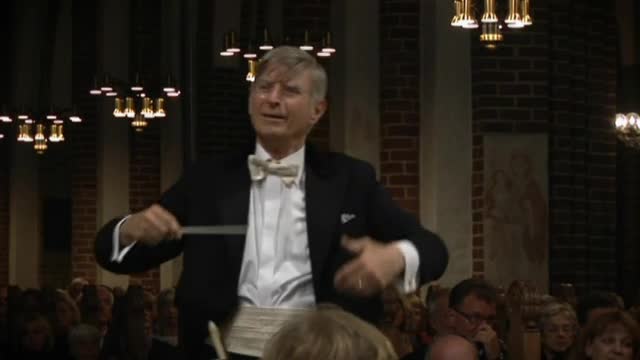

Herbert Blomstedt was born in Springfield, Massachusetts, in 1927 to Swedish parents, who returned to their home country in 1929. Having received his earliest musical training from his mother, a pianist, he studied at the Royal Music School in Stockholm between 1945 and 1950, specialising in conducting and church music, before going on between 1948 and 1952 to the University of Uppsala where his chosen subjects included psychology and religion as well as music. Between 1950 and 1955, Blomstedt attended the summer courses in conducting led by Igor Markevich at the Salzburg Mozarteum and also took part in the famous courses in contemporary music at Darmstadt, where he came into contact with John Cage. This experience was balanced by the study of Renaissance and Baroque performance practice at the Schola Cantorum in Basle. In 1953 he continued his conducting studies in the USA, with Jean Morel at the Juilliard School, and with Leonard Bernstein at Tanglewood, where he won the Koussevitzky Prize for conducting.
Blomstedt made his professional conducting début in 1954 with the Stockholm Philharmonic Orchestra. In the same year he was engaged as conductor of the Norrköping Symphony Orchestra and held this post until 1961, having meanwhile, in 1955, won first prize in the Salzburg International Conductors’ Competition. Between 1961 and 1971 he taught at the Royal Music School in Stockholm and from 1962 onwards he held a succession of major posts in the orchestral world, combining the best of the European tradition with the equally outstanding but different character of American music-making. Blomstedt was chief conductor of the Oslo Philharmonic Orchestra between 1962 and 1967, and of the Danish Radio Symphony Orchestra between 1967 and 1977; and in 1975 he was appointed chief conductor of the Dresden Staatskapelle. He remained at Dresden until 1985, undertaking extensive tours with the orchestra, and combining this tenure with his position, between 1977 and 1983, as chief conductor of the Swedish Radio Symphony Orchestra. During this period many of his performances with the Dresden Staatskapelle were recorded by Eterna, the state record company of East Germany, and by East German radio, as well as by the Japanese company Denon.
In 1984 Blomstedt conducted the San Francisco Symphony Orchestra for the first time and having been invited to become the orchestra’s chief conductor with effect from 1985 remained in this post until 1995, when he was named as its conductor laureate. This period was not an easy time for the orchestra as many of its musicians left to form the San Francisco Performing Arts Orchestra, which plays for the opera and ballet in the city. Nonetheless Blomstedt took the necessary reorganisation in his stride: there was no loss of quality and soon the orchestra was playing better than ever. In addition the orchestra and Blomstedt made a number of distinguished recordings for Decca, notably of symphonies by Mahler and Sibelius. Between 1996 and 1998 he led the North German Radio Orchestra, before being appointed with effect from 1998 as the chief conductor of the Leipzig Gewandhaus Orchestra, one of Germany’s oldest and most renowned orchestras. Distinguished predecessors in this post, which Blomstedt relinquished to Riccardo Chailly in 2005, included Wilhelm Furtwängler and Bruno Walter.
In addition to his permanent posts, Blomstedt appears with major symphony orchestras as a guest conductor, including the Berlin Philharmonic, Royal Concertgebouw, NHK Symphony, Boston Symphony, Chicago Symphony, New York Philharmonic, and Philadelphia Orchestras. He has an international reputation as a teacher of conducting, and has received many awards for his services to music, including the Wiener Flötenuhr in 1978, and the Ditson Award for distinguished service to American music in 1992. He is a Knight of the North Star, Stockholm, and a Knight of the Dannebrogen, Copenhagen. A committed Christian, he is a leading figure in the Seventh Day Adventist Church.
Herbert Blomstedt is a musician of sensitivity and refinement who ignores the media attention frequently focused upon major contemporary conductors, maintaining his attention upon the work in hand. His interpretations are notable for their clear sense of musical architecture. He is not afraid to impart the sense of drama inherent in the work of many composers such as Beethoven, and in this respect leans towards the values of conductors from earlier eras. His recordings are extensive. In addition to numerous works by Scandinavian composers, including two cycles of the symphonies of Carl Nielsen with the Danish National Radio Symphony and San Francisco Symphony Orchestras, he has recorded distinguished accounts of Beethoven’s opera Leonore (the first version of Fidelio), Brahms’s Ein Deutsches Requiem, and symphonies by Beethoven, Berwald, Bruckner and Schubert, as well as works by Richard Strauss, Bartók and Hindemith.
© Naxos Rights International Ltd. — David Patmore (A–Z of Conductors, Naxos 8.558087–90).
| Title | |
| BACH, J.S.: Mass in B minor, BWV 232 (Blomstedt) | |

|
BACH, J.S.: Mass in B minor, BWV 232 (Blomstedt)
Composer:
Bach, Johann Sebastian
Artists:
Blomstedt, Herbert -- Genz, Christoph -- Gewandhaus Chamber Choir -- Henschel, Dietrich -- Larsson, Anna -- Leipzig Gewandhaus Orchestra -- Ziesak, Ruth
Label/Producer: EuroArts |
| SCHUBERT, F.: Symphony No. 8, "Unfinished" / BRUCKNER, A.: Symphony No. 7 (Danish National Symphony, Blomstedt) | |

|
SCHUBERT, F.: Symphony No. 8, "Unfinished" / BRUCKNER, A.: Symphony No. 7 (Danish National Symphony, Blomstedt)
Composers:
Bruckner, Anton -- Schubert, Franz
Artists:
Blomstedt, Herbert -- Danish National Symphony Orchestra
Label/Producer: Dacapo |
